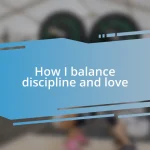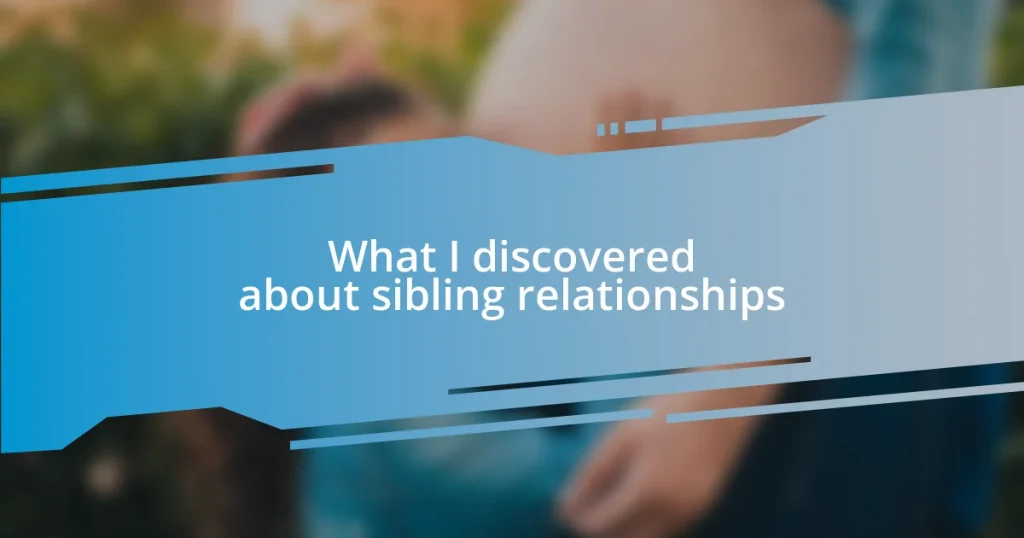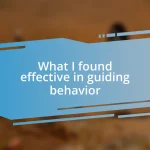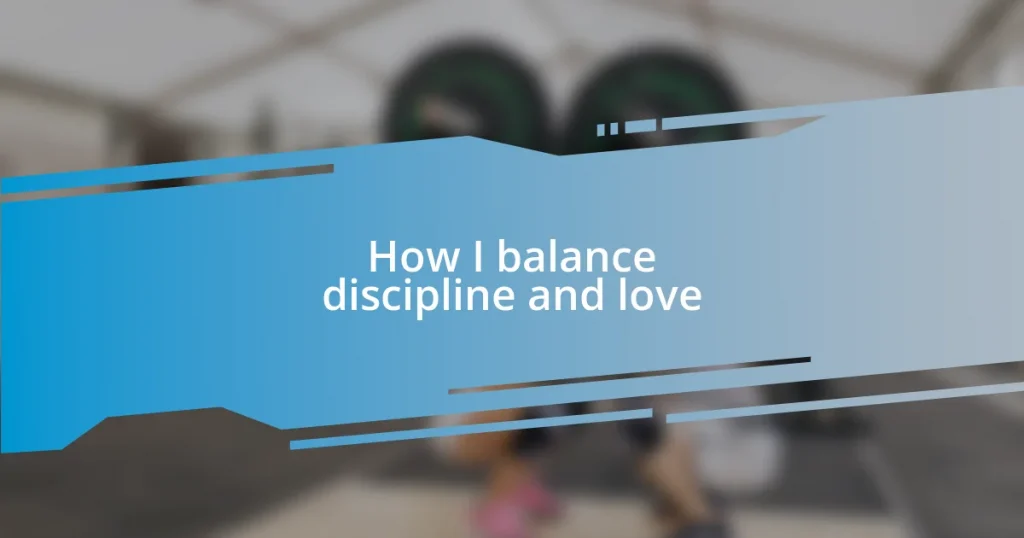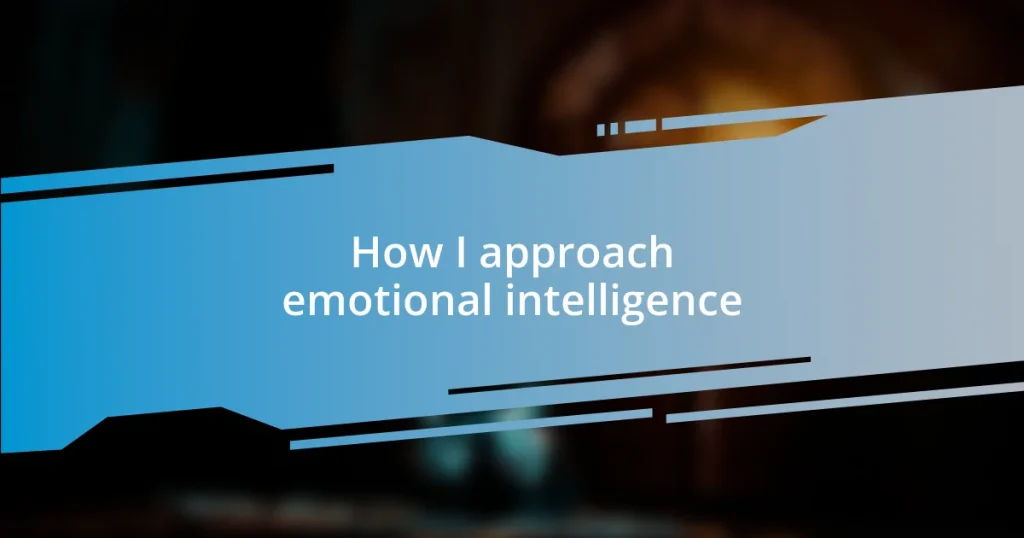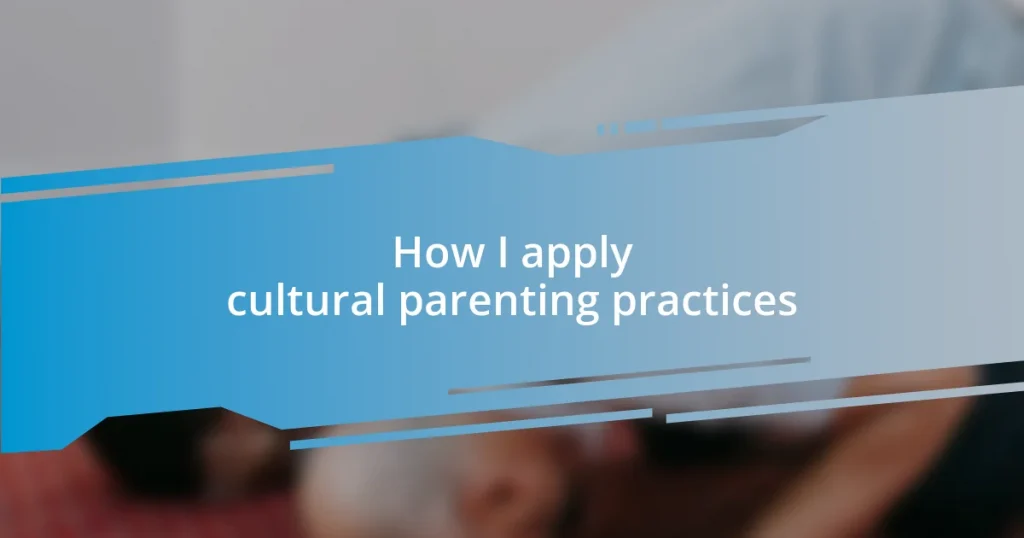Key takeaways:
- Sibling relationships provide essential emotional support, conflict resolution skills, and a sense of identity while evolving over time.
- Dynamic communication styles, including humor and non-verbal cues, foster deeper connections and understanding among siblings.
- Nurturing healthy sibling bonds through quality time, appreciation, and embracing individuality strengthens familial ties and creates lasting memories.
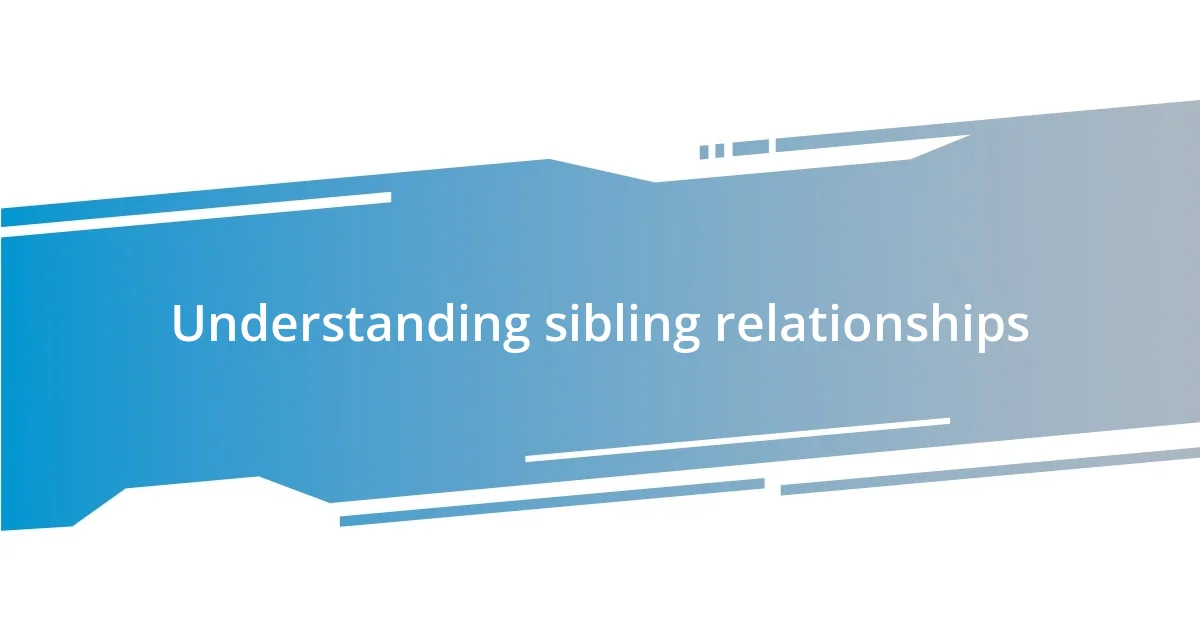
Understanding sibling relationships
Sibling relationships are often a complex blend of camaraderie and rivalry, shaped by shared experiences and unique personalities. I remember arguing over the remote with my younger brother for what felt like hours, only to find myself sharing secrets with him in the quiet of our room later that night. How is it that one minute you can feel so much annoyance towards a sibling, only to switch to deep affection moments later?
Every family dynamic is different, and these relationships can evolve over time. As we matured, my sister and I went from competitive school projects to collaborating on life choices, realizing that our differences brought us closer rather than driving us apart. Isn’t it fascinating how we can learn profound lessons about empathy and understanding through our sibling interactions?
It’s important to acknowledge that siblings often serve as our first social teachers. When my brother teased me relentlessly about my fashion choices, it hurt, but it also taught me resilience. Have you noticed how even these seemingly small moments can shape our emotional landscapes for years to come? By understanding the nuances of these relationships, we can appreciate the unique bonds that siblings create throughout their lives.
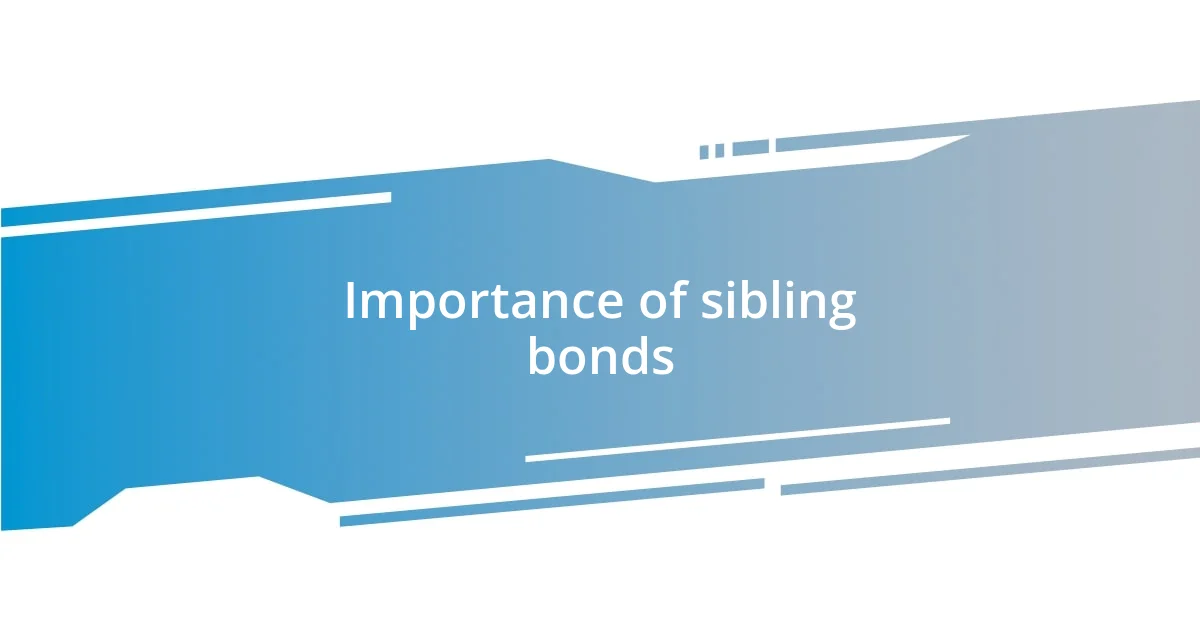
Importance of sibling bonds
Siblings play an essential role in our emotional development, often serving as our lifelong companions. I still cherish the late-night talks with my sister, where we confided in each other about our dreams and fears. Those moments not only strengthened our relationship but also provided a safe space for vulnerability that I didn’t find anywhere else.
The importance of these bonds can be highlighted through a few key points:
- Emotional Support: Siblings often provide the first instances of emotional support, helping us process our feelings and experiences.
- Conflict Resolution Skills: Learning to navigate disagreements with siblings lays the foundation for resolving conflicts in other relationships.
- Shared Memories: Growing up together creates a treasure trove of shared experiences that can foster a unique companionship throughout life.
- Sense of Identity: Siblings often help shape our identity by reflecting back our traits and values, facilitating self-discovery.
- Lifelong Connection: Even as adults, those sibling bonds can offer comfort during times of change, ensuring we have someone who truly understands us.
In my experience, these layers of support and connection are what make sibling relationships incredibly unique—they represent a bond that evolves yet remains steadfast through the ups and downs of life.
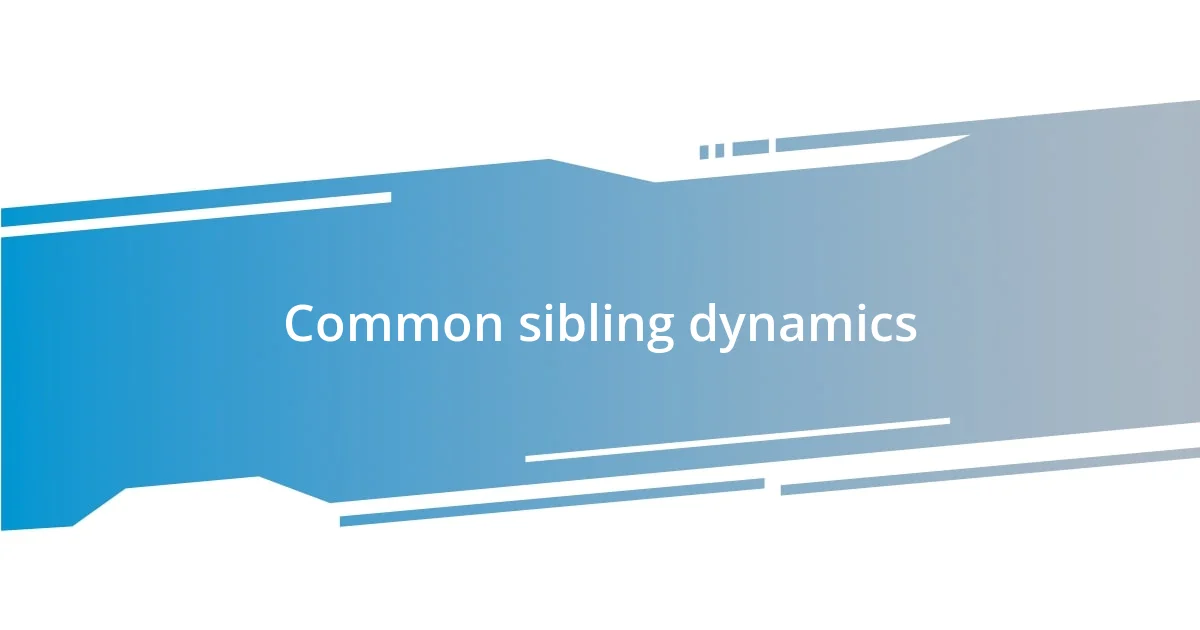
Common sibling dynamics
Sibling dynamics can often be a fascinating mix of love and rivalry. I recall a time when my sister and I were competitive about everything—who could finish their homework first or score the most points in video games. This competition pushed us to excel individually, yet I often found that those moments ignited a deeper bond. Isn’t it interesting how competition can sometimes foster teamwork when you realize you’re rooting for each other too?
There are also unique roles that siblings assume, such as the caretaker, the rebel, or the peacekeeper. My older brother was always the voice of reason during family squabbles, often mediating our differences with a calm demeanor. This taught me the importance of compromise. I believe that understanding these roles helps to clarify how we interact and relate to one another, and it’s fascinating to see them shift as we age. Do you notice how these dynamics evolve over time?
Of course, sibling dynamics can vary significantly from one family to another. In my circle, I’ve seen friendships form between siblings that resemble even closer bonds than those with friends. The way my sister and I would confide in each other about our crushes was reminiscent of sharing secrets with my closest buddies. It’s heartwarming how these relationships can shift from contentious to playful, learning to navigate each other’s worlds as we mature.
| Dynamic | Description |
|---|---|
| Competitiveness | Can drive personal achievement but also create a bond through shared goals. |
| Role Assignment | Each sibling may take on distinct roles that shape their interactions. |
| Friendship | Can develop over time, often leading to deeper emotional connections. |
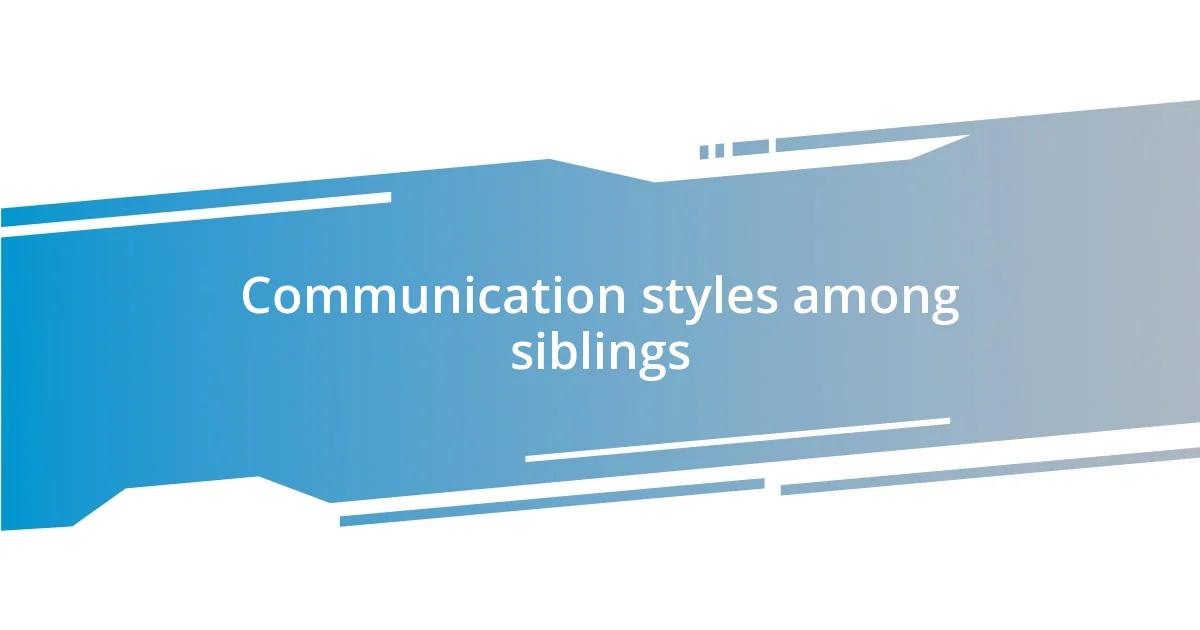
Communication styles among siblings
Sibling communication styles are as varied as the personalities involved. I remember how my younger brother had a knack for teasing—his playful jabs often made me laugh, even when they stung a bit. Isn’t it interesting how humor can serve as a bridge in sibling relationships, enabling deeper conversations while keeping things light? This back-and-forth created an environment where we could share our thoughts candidly without fear of judgment.
On the other hand, I discovered that some siblings communicate through actions rather than words. My sister was always the nurturer; she often showed her love through small acts, like bringing me my favorite snack when I was feeling down. It was a silent language that didn’t always rely on spoken words yet resonated deeply with me. Have you noticed similar tendencies in your family? These non-verbal cues can reveal so much about our relationships, often conveying understanding and support in ways that mere words can’t capture.
Additionally, I’ve seen how the technology impacts sibling communication in today’s world. Texting has become our go-to method; quick emojis and memes often replace longer conversations. Yet, I’ve found that those late-night phone calls still hold a special place in my heart. There’s something irreplaceable about hearing my brother’s voice, laughing together over shared memories or venting about life. Do you think technology strengthens or weakens sibling bonds? Personally, I believe it can enhance communication, but nothing beats that direct human connection.
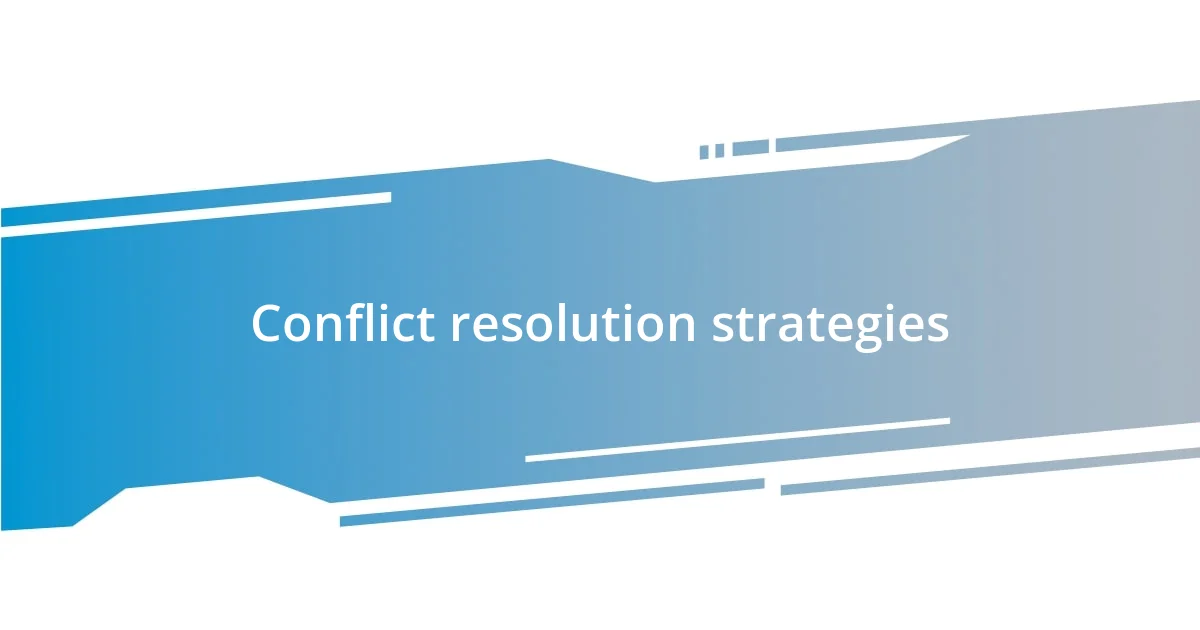
Conflict resolution strategies
When it comes to resolving conflicts, one strategy I’ve found effective is the “cool-off period.” I remember a heated argument with my sister over who got to pick the movie for movie night. Instead of escalating things further, we took a break and went to our separate corners for a bit. It’s surprising how some time apart can provide context and clarity, allowing each person to process their feelings before talking things through. Have you ever tried stepping back from a disagreement?
Another strategy I’ve valued is keeping the focus on feelings rather than accusations. Once, during a disagreement with my brother over chores, I expressed how overwhelmed I felt rather than blaming him for not helping out. This shift in conversation helped us understand each other’s perspectives without turning into a blame game. It made me wonder if we’re often too quick to point fingers instead of discussing emotions behind those frustrations.
Active listening is a game changer as well. I learned this during a tense moment with my twin. Instead of interrupting, I made a conscious effort to really listen and acknowledge her point of view. I could see the change in her demeanor as she felt heard and validated. Isn’t it amazing how simply paying attention can dissolve tension? It made me appreciate that sometimes, all we need is to feel validated in our feelings to bridge a divide.
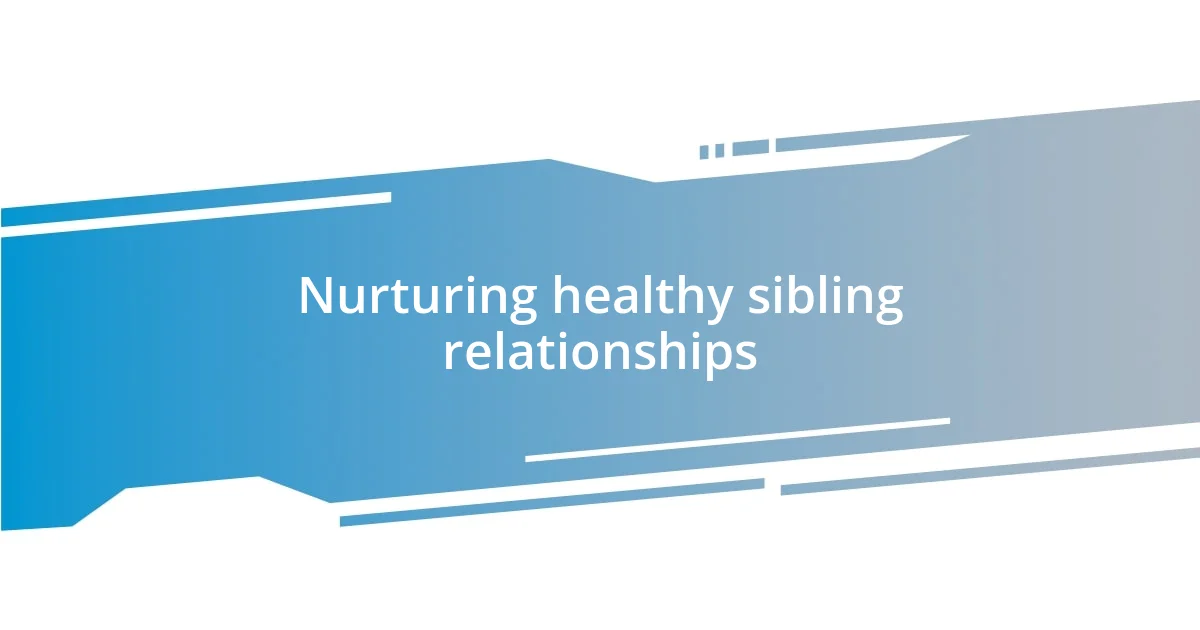
Nurturing healthy sibling relationships
Supporting healthy sibling relationships is essential, and I’ve discovered that spending quality time together can make a world of difference. For instance, I remember organizing a game night with my siblings—something as simple as retro board games sparked laughter and friendly competition. Have you ever noticed how these shared experiences create lasting memories? They seem to build a strong foundation of connection that can weather the ups and downs of life.
I also believe that expressing appreciation is crucial. I once wrote a heartfelt note to my sister, thanking her for always being there for me during tough times. Seeing her smile when she read it was priceless and highlighted how often we overlook the simple act of acknowledgment in our relationships. Do you take time to appreciate your sibling’s unique qualities? I find that small gestures like this can rekindle warmth and understanding, providing the reassurance that we’re genuinely valued.
Lastly, embracing individuality within the sibling bond is something I’ve come to cherish. My brother and I have vastly different interests—he’s into sports, while I lean towards arts. This contrast used to worry me, but I soon realized that celebrating our differences was more enriching than trying to mold ourselves into the same person. It’s fascinating how embracing these unique traits can foster respect and admiration for one another. Have you learned to appreciate the unique paths your siblings are on? For me, it’s a reminder that our individual journeys can strengthen the fabric of our family relationships.

